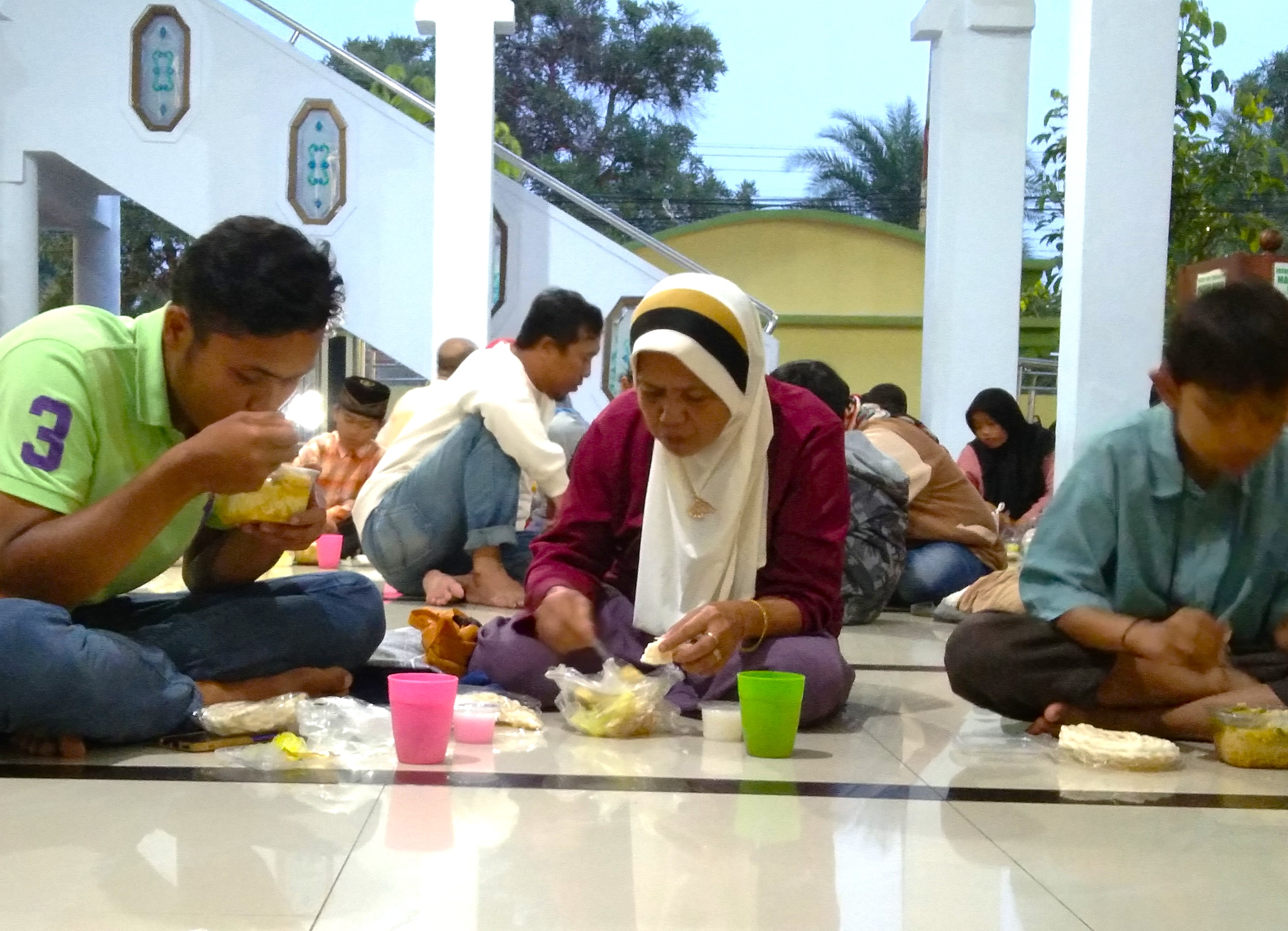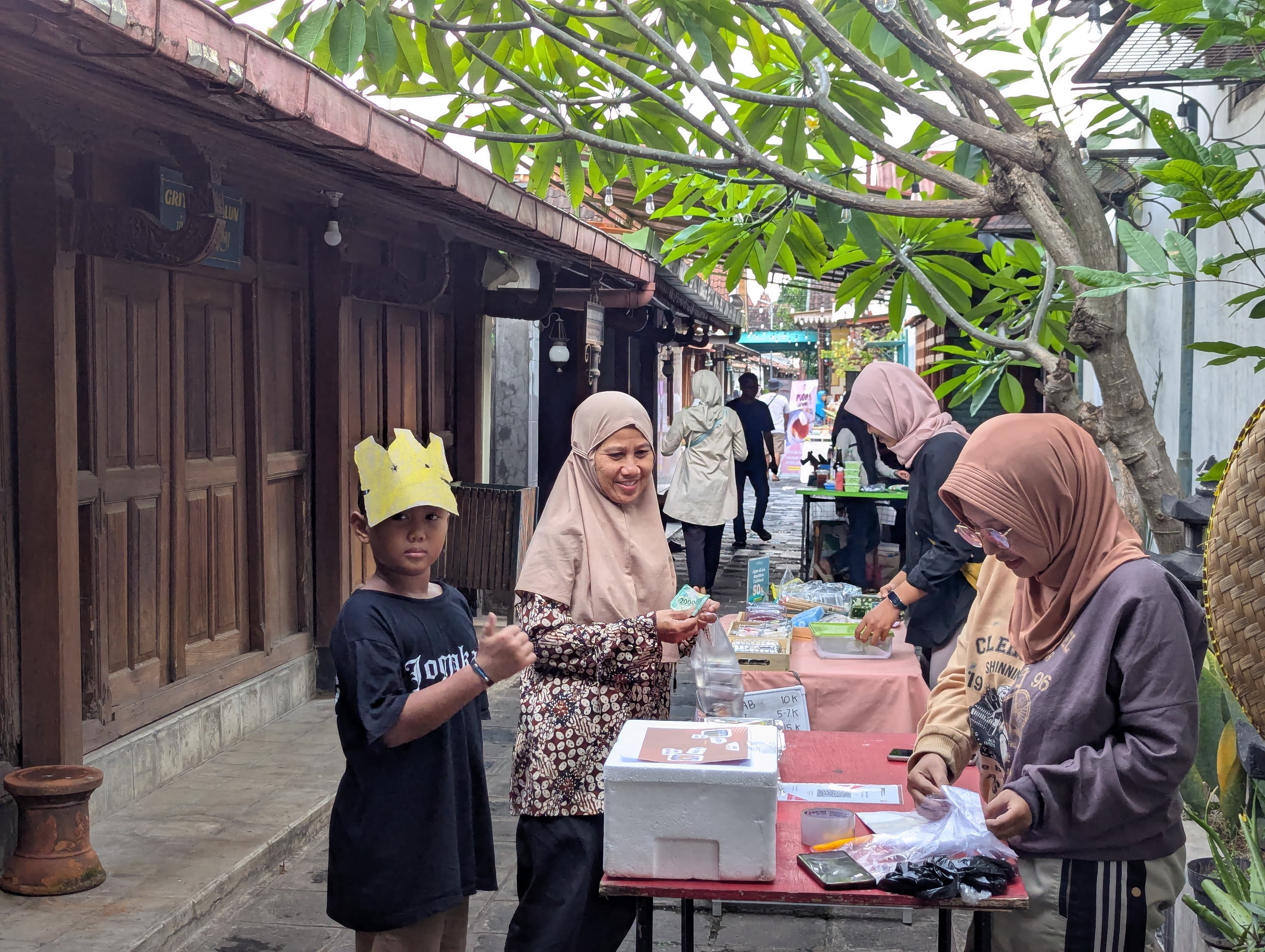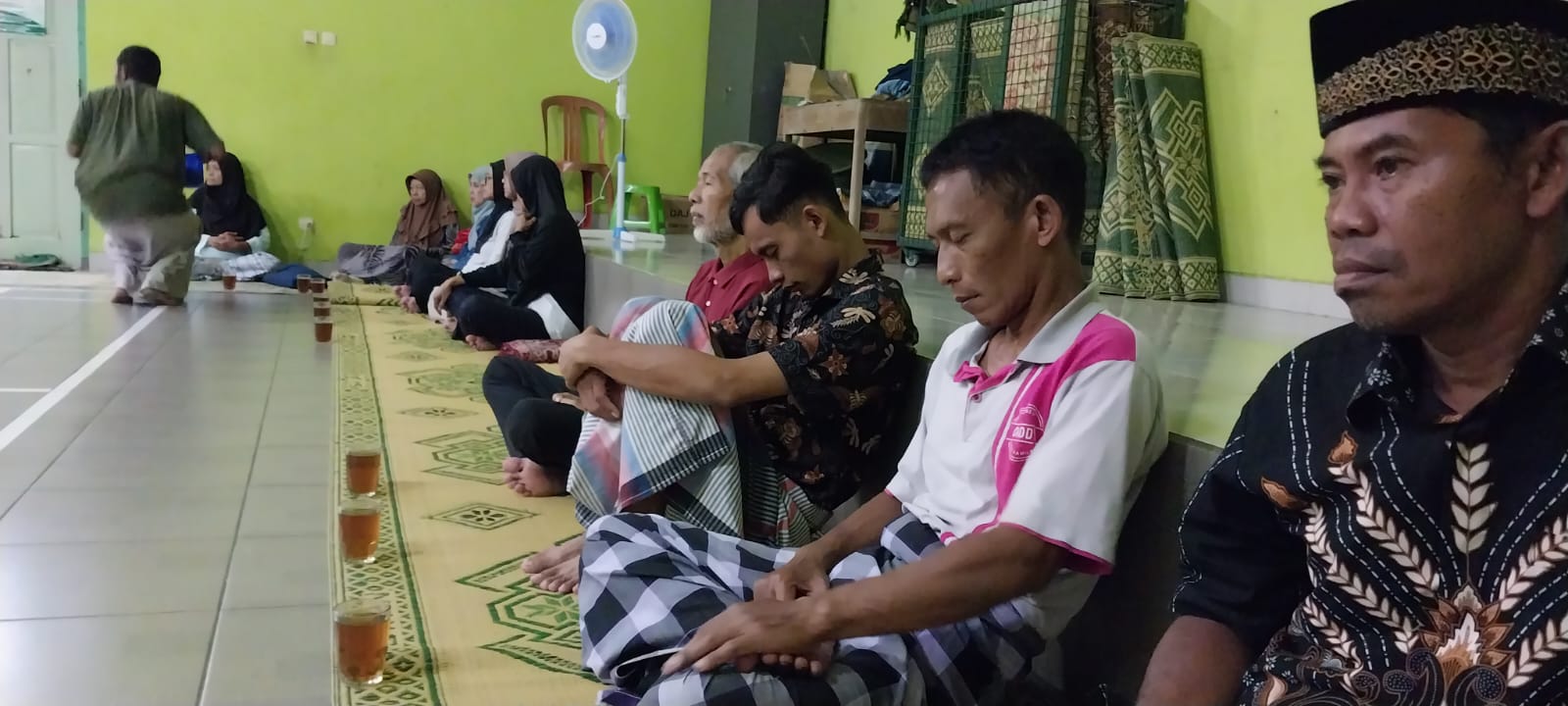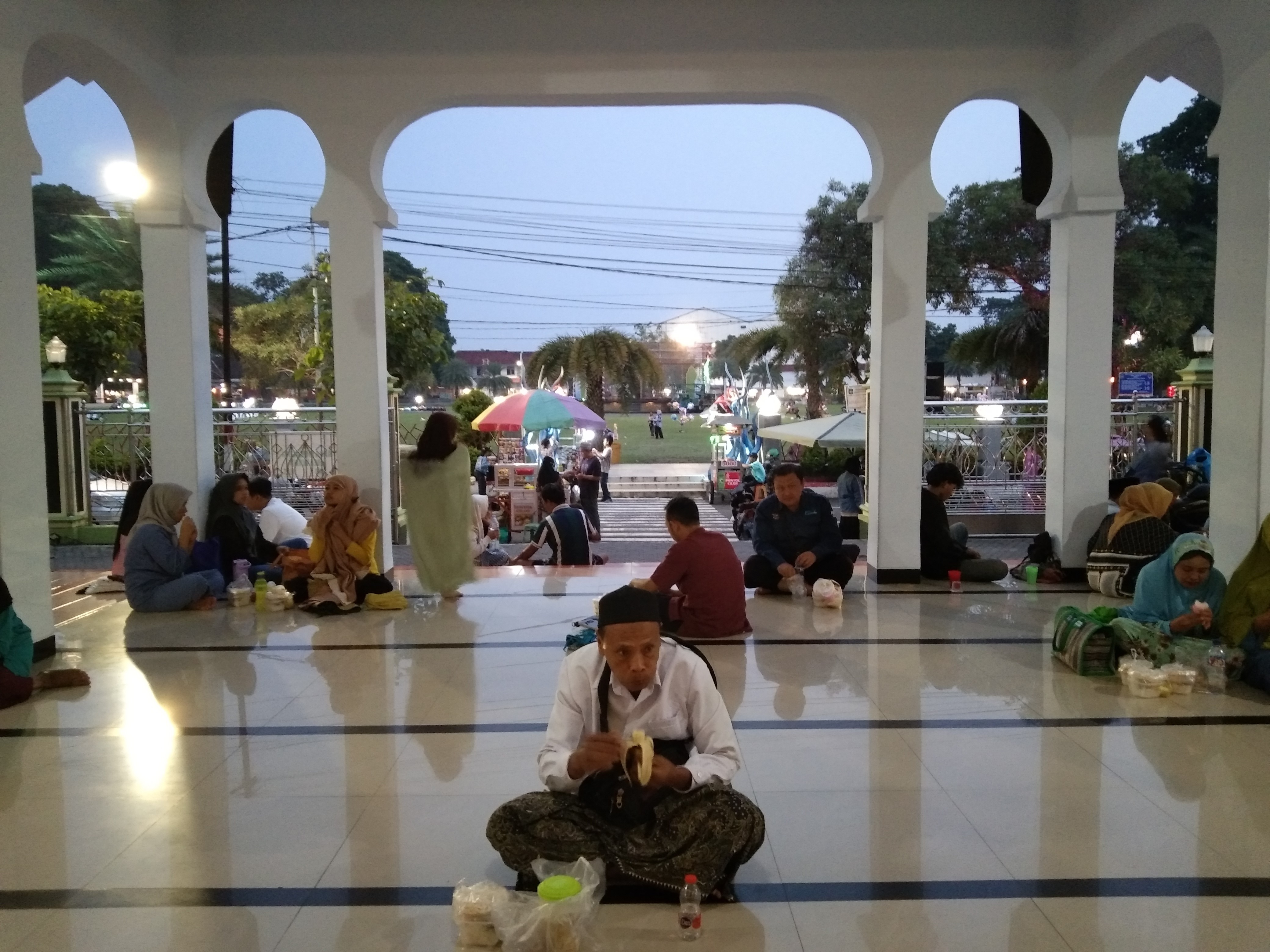
Takjil and Ramadhan Culture in Kotagede
The month of Ramadan in Indonesia is a time full of meaning and tradition. One of the most anticipated traditions is breaking the fast, known as "iftar." In Yogyakarta, especially in Kotagede, the tradition of breaking the fast becomes more special with the presence of takjil, which only appears during the month of Ramadan. Takjil is usually served in mosques for worshipers who perform Maghrib prayers there. Takjil served can be in the form of food or warm drinks, such as tea, kolak, and traditional snacks.
After performing the Maghrib prayer, the congregation can take takjil to be consumed on the spot. Sometimes, the amount of takjil provided is insufficient, so that some congregations do not get any. Meanwhile, in other mosques, the takjil provided is abundant, allowing the surrounding community to enjoy it. It is not surprising that hunting for takjil in mosques or prayer rooms in different locations has become an exciting tradition for young people at all times. This moment always leaves unforgettable stories and experiences that are woven into stories that are woven from time to time.
The development of this tradition opened up a gap for food traders to sell takjil along the highway during the month of Ramadan. Until the term war takjil emerged for culinary tourism locations that can be enjoyed every evening. This takjil market is not only enjoyed by Muslims, but people of other religions also mingle in a fun moment that is always present every month of Ramadan
This market is not just a place to buy appetizers, but also offers a cultural experience that combines cuisine, history, and the warmth of the local community.

As the afternoon sky begins to glow orange, signaling that it is almost time to break the fast, the atmosphere across Indonesia changes. On a busy street, in traditional markets, and even in quiet corners of the city, there is one tradition that is always present with hustle and bustle: takjil. Takjil, a simple term that refers to an appetizer when breaking the fast, has a much deeper meaning than just a dish eaten after a day of fasting.
Takjil is not just about food. It is a symbol of a meaningful spiritual journey, a moment to share, appreciate togetherness, and perfect gratitude for what has been given. In the month of Ramadan, takjil becomes more than just a meal: it is a reminder of the importance of patience, sincerity, and deep gratitude.

Waiting for the Time to Break the Fast: Between Patience and Desire
Fasting in the month of Ramadan is not just about holding back hunger and thirst, but also testing patience and self-control. After a day of refraining from everything that breaks the fast, takjil becomes a highly anticipated moment. When the maghrib call to prayer sounds, there is a feeling of relief and deep happiness when the mouth tastes the sweetness of the first dish after a day of holding back hunger.
However, the meaning of takjil is deeper than just that sense of relief. Takjil teaches us to wait patiently. In every moment of waiting to break the fast, there is an opportunity to reflect, appreciate time, and strengthen the inner bond with the Creator. It feels like every mouthful of takjil brings a greater sense of gratitude, remembering the many blessings that we sometimes forget in our daily lives.
Takjil is also a means to strengthen relationships between people. In every takjil market held along the street, not only food is traded, but also the warmth of sharing. Traders and buyers smile at each other, chat casually, and share stories about their daily activities. The moment of breaking the fast is the right time to meet old friends, get to know new people, and feel a sense of genuine togetherness.
For many people, buying takjil is not only to fulfill their food needs, but also to feel a strong social bond. A smile or friendly greeting from the trader selling takjil becomes an integral part of the breaking-fast ritual, making the moment feel more valuable. Takjil is also a way to share with those who may be less fortunate. In many places, it is not uncommon to see people who voluntarily share takjil with others, especially for those who cannot afford to buy food to break the fast.
Behind a series of mouth-watering takjil dishes—banana compote, fruit ice, something fried, kue cucur, and kue lapis—there is a profound message: to appreciate every second. The month of Ramadan teaches us to realize how precious time is, how every mouthful of food we enjoy after fasting is a blessing that must be appreciated. Takjil, with all its diversity, is a reminder that we must enjoy every moment, appreciate what we have, and celebrate every blessing that comes with gratitude.
More than just an appetizer, takjil is part of a ritual that unites people. When the maghrib call to prayer is heard, when we break our fast with a pinch of kolak or a glass of fruit ice, there is a feeling of warmth that flows within us. This is not only because of its refreshing sweetness, but also because of the meaning behind it. Takjil is real proof that every struggle has a reward, that every test of life will have a moment to celebrate the happiness that comes.

A Tradition that Connects the Past and the Present
Takjil also serves as a link between the past and the present, between the older and younger generations. Every time someone enjoys takjil, a memory is built, a memory of a Ramadan filled with togetherness, which is passed down from generation to generation. This tradition not only survives because of its delicious taste, but also because of the values contained within it. It teaches us about the importance of sharing, about remembering the less fortunate, and about celebrating life with gratitude.
When someone tastes takjil in the month of Ramadan, he not only feels the sweetness on his tongue, but a sense of peace in his heart. Takjil is a way to celebrate life, celebrate togetherness, and celebrate the love that is forgotten between people. It reminds us that even though life is often full of challenges, there is always a moment to stop, be grateful, and enjoy the beauty of simplicity.
And so, in the month of Ramadan, takjil becomes more than just food. It becomes a symbol of all that is beautiful about life—blessings, togetherness, and endless gratitude.
Kotagede: Traces of History Amidst Modernity
Kotagede is a part of a historical area in Yogyakarta, which is known as the former center of the Islamic Mataram Kingdom. Known for its historic building architecture and atmosphere that is thick with the feel of the past, Kotagede is a place that tells stories about the glory of the kingdom that once triumphed on the island of Java. Traditional houses with unique ornaments, narrow alleys leading to the market, and historic mosques provide the perfect backdrop for the annual Ramadhan takjil market.
When the sun begins to set, Kotagede becomes a witness to a different life. The takjil market held along the narrow streets of Kotagede offers an experience that cannot be found anywhere else. Here, travelers can feel the typical atmosphere of breaking the fast, while enjoying a variety of delicious traditional Indonesian foods.

Pasar Takjil, A Tradition of Breaking Fast with Memories
During the month of Ramadan, the takjil market becomes a magnet for many people, both locals and tourists, who want to experience the unique atmosphere when breaking the fast. This market usually starts about an hour before the time to break the fast, and this is where people gather to buy various types of takjil, or appetizers, consisting of traditional Indonesian foods.
Takjil is not just an appetizer, but more than that, it is part of a social tradition. Kotagede residents are happy to share stories, chat, and build relationships with people around them. Rows of vendors selling various foods such as kolak pisang (banana with coconut milk and brown sugar), es buah (a mixture of fresh fruit with sweet syrup), fried foods (such as tempe mendoan and bakwan), and quail egg satay are typical sights. Each takjil has its appetizing taste, and of course, there is nothing more delicious than eating it after a day of fasting.
One thing that makes the takjil market in Kotagede so special is the sense of family and friendliness created between sellers and buyers. Although the market is very crowded, everyone shares smiles and enjoys the moment together. This atmosphere enriches the experience, especially for foreign tourists who may be experiencing the atmosphere of Ramadhan in Indonesia for the first time.
The takjil market in Kotagede is not only about food, but also about how culture and history blend with everyday life. Kotagede, which is part of Yogyakarta, has many interesting historical relics to explore. Historical buildings, such as the hundreds-of-years-old Kotagede mosque, as well as traditional Javanese houses with distinctive architecture, add a magical impression when walking through the takjil market. Enjoying takjil amidst these historical buildings provides an experience that not only excites the stomach but also touches the soul.
For foreign tourists, Kotagede offers the opportunity to see firsthand how this centuries-old tradition is still alive today. The takjil market is a kind of cultural window that allows people to experience the traditional life of the Yogyakarta community. Here, culinary, history, and togetherness go hand in hand, creating a warm atmosphere.

Why You Should Visit Kotagede During Ramadan?
Visiting Kotagede during Ramadan is a unique and unforgettable experience. For tourists who are interested in Indonesian culture, cuisine, and history, the takjil market in Kotagede is the perfect way to experience another side of Yogyakarta. Here, you will not only enjoy delicious food, but also get the chance to see firsthand how the people of Yogyakarta celebrate Ramadan with joy and togetherness.
In addition, Kotagede is the right place to experience the authenticity of Yogyakarta that is untouched by the hustle and bustle of the big city. With a calm atmosphere but still alive with various cultural activities, Kotagede provides an authentic experience for anyone who wants to get closer to the traditions and beauty of the city of Yogyakarta.
Takjil is not just an appetizer, but a symbol of a tradition that connects hearts. In Kotagede, the takjil market is a place where Ramadan traditions, culinary specialties, and history meet, creating an unforgettable cultural experience. For foreign tourists, this is an opportunity to better understand Indonesia through the taste, atmosphere, and stories behind every bite of food.
So, if you are planning to visit Yogyakarta, make sure you take the time to visit the takjil market in Kotagede. Enjoy delicious takjil, feel the warmth of culture, and get to know more about the traditional life of Yogyakarta which is rich in history. With all its charm, Kotagede promises an experience that will make you come back again and again.
Tag: accomodation, architecture, architecturelovers, coffe, community, cooking, culinary, culture, culturelovers, cycling, experience, explore, familytravelers, food, heritage, hiking, history, hospitality, humaninterestfotographer, indonesianculturaltourism, indonesianhistorytourism, indonesiantourism, local, locallovers, localtea, nature, naturelovers, tradition, traditional, traditionalfoods, travel, travelersfotographer
